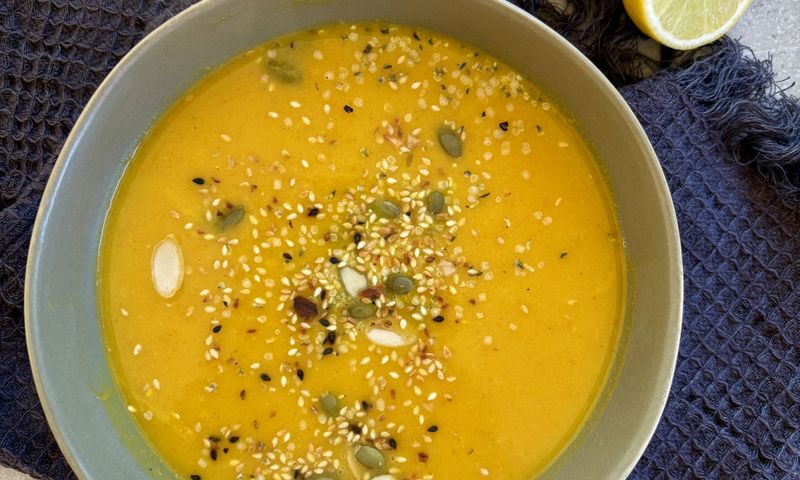Published 11 Aug 2025
Vitamins play an important role in our body. Vitamins help our body fight off illness, repair our external and internal wounds and even prevent extreme diseases. It’s crucial that we aim to include all the vitamins in our daily lives. Let’s look more closely at one of the most beneficial vitamins and its health advantages together.
What is vitamin C?
Vitamin C (ascorbic acid) is easily the most well-known of the essential nutrients, commonly found in everyday foods, manufactured drinks and supplements and boasting many health benefits. But why is it so important? Prized for its antioxidant qualities, vitamin C plays an important role in many bodily functions. It can help to keep your skin, bones, blood vessels and connective tissues healthy, improve your body’s iron absorption and support your immune system. Not only is vitamin C renowned for reducing the risk of disease, it can also help to alleviate symptoms.
How to get more vitamin C in your life
Unlike most of the animal kingdom, humans can’t make their own vitamin C. This means that our vitamin C intake must come from our diet.
Want to know how to get more vitamin C in your diet? Here’s a list of fresh produce that are vitamin C-rich superfoods:
- Citrus fruits like oranges, lemons and limes
- Berries like strawberries, blueberries and raspberries
- Tropical fruits like mangoes, pineapple and papaya
- Melons like rockmelon and watermelon
- Tomatoes and capsicums
- Broccoli, cauliflower and Brussels sprouts
- Spinach, cabbage and other leafy greens
- Potato and sweet potato
How much vitamin C do you need?
The recommended daily dose of vitamin C differs depending on your own needs, but typically;
- Adult males should aim for 90mg
- Adult females should aim for 75mg
- Infants need a high amount of vitamin C, around 40-50mg for the first year
- During the early childhood years, children don’t need as much vitamin C, but the recommended dose increases as they hit the teenage years.
People who smoke, or people who are exposed to second-hand smoke, require more vitamin C. This is because smoking increases the amount of vitamin C needed to repair the body after exposure. Smokers should add 35mg to the recommended daily intake totals above.
Looking for support to quit? Listen to GMHBA’s Healthier Together podcast ‘Understanding your smoking addiction’ to help improve your chances of quitting.
How does Vitamin C help our bodies?
Vitamin C is an antioxidant, which means it inhibits the process of oxidation. Oxidation is part of the body’s normal metabolic processes, but when left unchecked it can tip the balance in favour of free radicals and lead to oxidative stress. Oxidative stress is linked to the effects of aging and many health conditions, including diseases commonly associated with getting older, like arthritis.
Some of the benefits of vitamin C include:
- Improved immune function – Vitamin C helps protect cells in the immune system from free radical damage and enhances the body’s defences.
- Improved eye health – Vitamin C can slow down the impacts of aging-related eye diseases, including age-related macular degeneration, which is the main cause of blindness in people over 50. It also plays a role in the prevention of cataracts.
There are so many benefits to vitamin C, especially when it works alongside the other vitamins to support a healthy lifestyle!
Vitamin C and skincare
Vitamin C has more benefits, especially when it comes to skincare. Vitamin C helps reduce the appearance of dark spots, acne scars and pigmentation in the skin, as well as redness, thereby balancing the complexion and making skin appear brighter. Young adults and teenagers will be interested in its evening properties, specifically post-acne treatment. You can harness the skin-brightening benefits of vitamin c through topical application of serums, lotions and leave-on masques for the face. It’s important to properly read the active ingredient list on these serums, as ascorbic acid on its own is highly unstable and will have little effect on your skin. Look for ingredients like Sodium Ascorbyl Phosphate, Magnesium Ascorbyl Phosphate, Ascorbyl Palmitate or Ascorbyl Tetraisopalminate. Always test products on a small patch of your skin before lathering all over your face. The ingredients in some skincare products may cause irritation or reverse the intended balancing effects, leaving the skin dry, oily or reactive.
It’s not just young people who can see improvements in their skin health and appearance, thanks to vitamin C. This important anti-oxidant plays a key role in the production of collagen and maintaining elastin in the skin. Clinical studies from Harvard have demonstrated that vitamin C can improve overall skin texture and appearance. Additionally, vitamin C can help protect the skin from the harmful effects of sun exposure, when paired with a powerful broad-spectrum sunscreen.
In Australia, we’re fortunate to live under clear skies, but with our wonderful weather comes a high risk of skin damage. Using vitamin C-rich hydrating serums can replenish sun-damaged skin, as well as help to protect the skin from further harm. Learn more about protecting the health of your skin and performing a skin check.
Can vitamin C cure a cold?
Has someone ever told you that if you’re sick with a cold, you should eat an orange? It’s a common belief that vitamin C can stop a cold. The truth is that Vitamin C can’t prevent a cold - nothing except avoiding the germs to start with can. However, it may help reduce the symptoms of a cold and shorten the amount of time you’re sick.
The best thing you can do to keep well during the winter months is maintain a balanced diet, keep fit and warm, and avoid the winter illnesses being passed on by others as best as you can!
Further tips:
Vitamin C is useful for loads of things: heart health, eye health, skin health…the list goes on!
If you’re looking to include more vitamin C in your diet, why not try and get some produce from your local farmers market? It’s bound to be rich in flavour, fibre and vitamins.
Looking for some immune boosting goodness? Try these healthy winter recipes.
Feeling the winter blues? Beat them with these tips: Combat The Winter Blues To Boost Mental Health



